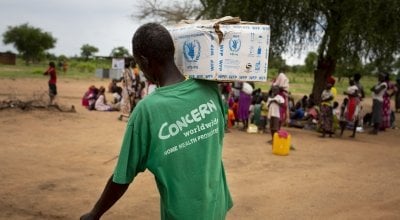
Read our 2023 annual report

Knowledge Hub
In 2021, a troubling fact about world hunger was revealed: As many as 828 million people were undernourished, undoing more than a decade’s worth of progress against hunger.
One of the most ambitious of the Sustainable Development Goals is to achieve Zero Hunger by 2030. However, with less than a decade to go, the 2022 Global Hunger Index notes that - without a major shift - the world as a whole, including 46 countries in particular, won’t even reach “low” levels of hunger by then.
But can world hunger actually be solved? What are the actual chances of eliminating it given the size and scope of the causes of hunger? And what are the areas we need to focus on in order to move closer towards this goal?
We gathered the thoughts of six notable people from different sectors who have informed opinions on the subject.
This includes an economist, a historian, a former Vice President, and the chief of an international aid agency that you may already be familiar with.
Here’s what they said:
The Historian: Gabriela Soto Laveaga
Gabriela Soto Laveaga is a professor of the history of science at Harvard University. She is currently working on a book about agricultural research and water in Sonora, Mexico and Punjab, India.

"It is critical to look at hunger as more than a technical problem to be addressed through scientific advancement alone."
Hunger has often been framed as an achievable numbers game of producing more food to feed more people... Yet history shows that science alone, even with generous funding, cannot solve an issue that is social, political and economic, such as hunger.
Hunger [is] not a yields game alone, but also a matter of equitable distribution of locally grown food.
It is critical to look at hunger as more than a technical problem to be addressed through scientific advancement alone.
The Politician: Joseph Nyumah Boakai
From 2006 to 2018, Joseph Nyumah Boakai served as the Vice President of Liberia under President Ellen Johnson Sirleaf. He was also Liberia’s Minister of Agriculture between 1983 and 1985. Liberia consistently ranks among the world’s hungriest countries on the annual Global Hunger Index.

"We must take bold, appropriate and timely actions."
We know that our world can feed all of its people now and in the future, and end hunger if we do the right things now. Therefore, we must identify and accept those fundamental changes that must be made in mainstreaming our thinking on the problems. This will include making a clear distinction between our goal for ending hunger and malnutrition and placing the food security of our individual countries and that of our world on a sustainable path. We must create conducive conditions for smallholder farmers to contribute to raising food availability by 70% by 2050 - which is what will be required to feed a growing and more urbanised population.
We must take bold, appropriate and timely actions that will include measures to enhance production. And we must ensure that smallholders are both protected from the threats of climate change, and promoted as custodians of natural resources so that they share the responsibility for protecting the planet.
The Activist: Alex de Waal
Alex de Waal is the executive director of the World Peace Foundation at the Fletcher School of Law and Diplomacy at Tufts University, and contributed an essay on conflict and hunger to the 2015 Global Hunger Index.

Political commitment at the highest levels to prevent famine, no matter what the political context, is needed.
We need political leadership to strengthen international food security policy. This depends on political decisions in western capitals - and these are not always easy to make.
While the United Nations and powerful governments can predict and stop major food crises, ultimately the decision is always political. Faced with an imminent famine in Somalia in 2011, the US government waited until famine was well advanced to authorise assistance. Behind the scenes, US counterterrorism legislation made it impossible for UN agencies and nongovernmental organisations to operate in insurgent-controlled areas. To do so would be to risk being accused of supporting a terrorist organisation. Only when the United Nations moved to declare famine in Somalia was the United States ready to respond and allow others to do so without automatically running afoul of its prohibition on supporting terrorism.
The lesson is clear: Political commitment at the highest levels to prevent famine, no matter what the political context, is needed. Countries in need should be aided, regardless of their standing with any other government.
The Economist: Caroline Krafft
Caroline Krafft is an associate professor at St. Catherine University’s Department of Economics and Political Science in St. Paul, Minnesota. She authored the chapter “Can We End Hunger?” for the textbook Economics for the Greater Good.

There is reason to hope that we can end hunger.
There is reason to hope that we can end hunger. The world already produces enough food to feed everyone. This production is, however, unequally distributed across countries and across households and individuals within countries. Differences in technology, physical and human capital and labour across countries are a key driver of international inequality. These differences arise for a variety of complex forces, ranging from the impact of colonialism to differences in physical climate.
The Nutritionist: Jane Napais Lankisa
Jane Napais Lankisa is a trained nutritionist and Masai activist from Kenya who advocates for the nutrition of adolescent girls as a key element of achieving both Zero Hunger and gender equality.

Adolescence is the second window of opportunity to end the intergenerational cycle of malnutrition.
The priority group for nutrition include children under five, adolescents, women of reproductive age, and the elderly.
In most developing countries, nutrition initiatives have been focusing on children and women, thus neglecting adolescents. Adolescence is the second window of opportunity to end the intergenerational cycle of malnutrition.
This stage is characterised by rapid physical, cognitive and psychosocial growth. There are 1.3 billion adolescents in the world today, more than ever before, making up 16% of the world's population. Nevertheless, this age group is classified as most vulnerable to malnutrition according to the WHO.
It is my plea that nutrition interventions such as adolescents’ access to sexual reproductive health services, micronutrient supplementation, nutrition intervention for pregnant adolescents, and interventions to improve vaccine uptake among adolescents are given top priority. Adolescents are the missing link in the fight against malnutrition, and most programmes being rolled out are either for children or adults, and no special attention is paid to this age group.
The Humanitarian: Dominic MacSorley
Dominic MacSorley spent four decades working with Concern Worldwide in a variety of contexts, including as the organisation’s CEO from 2013 until 2022.

Despite all that humanitarian assistance is achieving, and its extraordinary impact, it is falling short.
The story of reducing hunger has not been linear, and is certainly far from triumphant. In 2016, for the first time since 2000, global hunger started to rise and has been rising ever since, driven by conflict, climate-related disasters, and now COVID-19.
Against this cataclysmic backdrop, many donor nations are turning increasingly inward. Earlier this year, a fundraising conference organised by the UN to avert famine in Yemen fell drastically short of its targets as donor nations shied away from helping those facing catastrophe. Despite all that humanitarian assistance is achieving, and its extraordinary impact, it is falling short. The combination of new and unprecedented levels of need and the inadequate levels of humanitarian funding has put us on course for great tragic and avoidable loss of life. This is inexcusable. No one should die because of a lack of money or will.
The knowledge, resources and capacity exists to end global hunger by 2030, the goal set by the United Nations. However, that will not come close to happening without renewed urgency and resolve.
All quotes have been either obtained directly or are taken from recent speeches and writings. Click on each figure’s name in their bio to read more.




